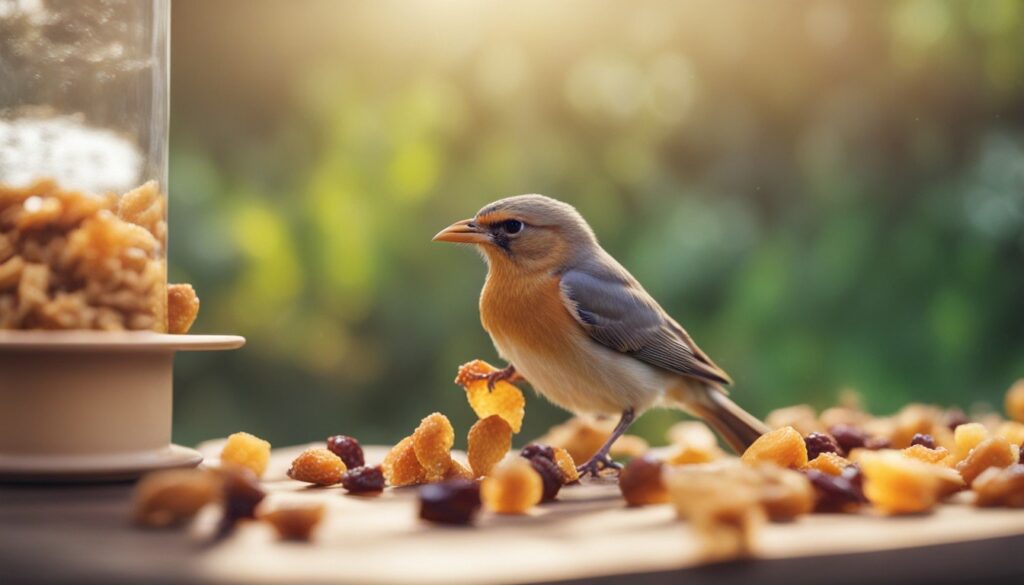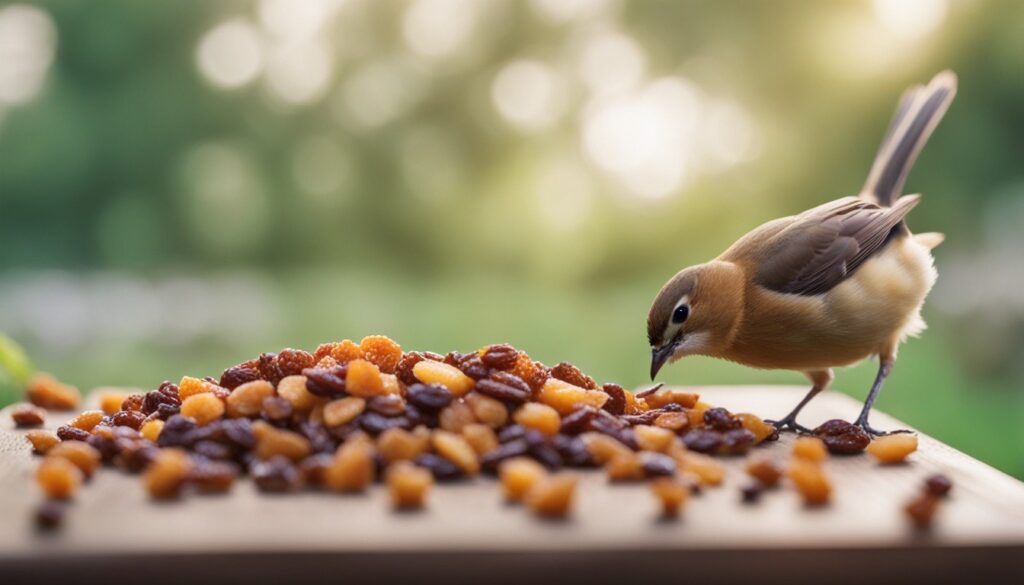Can birds eat raisins? Feeding wild birds is a popular hobby for many people. It provides enjoyment while also supporting local bird populations.
When choosing foods to offer birds, it’s important to select nutritious options that are safe for them to eat. One food that often comes up is raisins. But can birds eat raisins?
Raisins are dried grapes. They make a tasty snack for people, but how do they impact birds?

In this article, we’ll explore the pros and cons of feeding raisins to birds. We’ll look at which species can safely eat raisins, proper feeding guidelines, potential health risks, and healthy alternatives.
Key takeaways:
- Raisins can be a tasty and convenient food for birds, but they should be fed in moderation and as part of a balanced diet.
- Soaking raisins in hot water for a few minutes can help plump them up and make them more attractive to birds.
- Some birds, like doves, pigeons, and parrots, may have difficulty digesting raisins and may experience digestive problems if fed raisins.
- There are many alternatives to feeding raisins to birds, such as fresh fruit, berries, nuts, seeds, kitchen scraps, and commercial bird food.
- It’s important to note that while these foods are safe for birds to eat, they should be fed in moderation and as part of a balanced diet. Overfeeding birds with any food can lead to health problems.
Nutritional Value of Raisins for Birds
Raisins provide some beneficial nutrients, especially when compared to other sugary human snacks.
But their nutritional value depends on the bird species eating them.
Useful Nutrients
Raisins contain dietary fiber, antioxidants, and several minerals. Specifically, they are high in:
- Iron
- Potassium
- Copper
- Manganese
- Vitamin B6
They also contain boron, which supports bone and joint health. Oleanolic acid and linoleic acid in raisins have antibacterial properties that inhibit plaque-forming oral bacteria.
Raisins are low in sodium and high in potassium, which promotes healthy blood pressure. Their antioxidants help maintain the mouth’s pH balance to prevent cavities.
Potential Benefits
For birds that can safely eat raisins, they offer these potential nutritional benefits:
- Valuable trace minerals like selenium, magnesium, and phosphorus
- Additional calcium, iron, and potassium
- A convenient, tasty supplement to add variety to birds’ diets
- Natural food source for species like robins and thrushes that consume raisins in the wild
However, raisins should always be fed in moderation as part of a nutritionally balanced diet. Overfeeding raises risks of obesity and other health issues.
Birds That Can Safely Eat Raisins
Most birds with diverse diets that include fruits and berries can consume some raisins safely. Species known to enjoy raisins include:
- Blackbirds
- Bluebirds
- Catbirds
- Cedar waxwings
- Gray catbirds
- Grosbeaks
- Jays
- Mockingbirds
- Northern cardinals
- Northern flickers
- Orioles
- Robins
- Scarlet tanagers
- Thrashers
- Thrushes
- Woodpeckers
These omnivorous birds are used to digesting natural sugars and fiber found in fruits.
Again, moderation is key when offering raisins to prevent nutrition imbalances or obesity.
Birds That Should Avoid Raisins
Some birds cannot properly digest raisins and other dried fruits. Feeding them raisins risks causing digestive upset or toxicity. Birds that should avoid raisins include:
- Doves and pigeons – Their digestive systems aren’t designed to handle dried fruit.
- Parrots – Some parrots tolerate limited raisins, but they’re prone to obesity, and excess raisins raise health risks.
- Hummingbirds – Dependent on nectar, hummingbirds cannot digest raisins.
Raisins may also cause adverse reactions in:
- Young fledgling birds who aren’t mature enough to digest raisins.
- Any birds not accustomed to fruit-based foods in their normal diet.
It’s safest to avoid feeding raisins to sensitive species like these.

Proper Feeding Guidelines
When feeding raisins to appropriate bird species, follow these guidelines:
- Soak raisins in hot water for a few minutes first. The water makes them softer and easier to digest.
- Drain soaked raisins well before putting them out for birds.
- Mix raisins into a balanced diet with other foods.
- Limit portion sizes to a thin scattering of rehydrated raisins. Too many raisins can lead to obesity and nutritional imbalance.
- Never offer raisins to doves, pigeons, parrots, hummingbirds, or other birds that don’t digest fruit well.
Following these precautions provides birds a safe, nutritious treat.
Potential Health Risks of Raisins for Birds
While suitable for some species, raisins do come with some risks, especially if overfed. Potential health issues include:
- Obesity – Raisins are loaded with natural sugar and calories. Too many boosts birds’ weight and fat deposits.
- Nutritional imbalances – Excess raisins can crowd out other important foods in birds’ diets.
- Digestive problems – The high fiber and sugar content may cause gastric distress in sensitive species.
- Toxicity – Grapes can cause kidney failure in some birds. The dried versions may have a similar effect from built-up toxins.
Studies on raisin safety in birds are limited. But it’s best to err on the side of caution by limiting raisin quantities and avoiding at-risk species. Monitor birds for signs of illness after feeding.
Healthy Alternatives to Raisins
Rather than raisins, consider offering birds these other safe, nutritious foods:
- Chopped fruit – Apples, oranges, pears, bananas, watermelon, berries
- Unsalted nuts – Peanuts, almonds, walnuts
- Cooked unseasoned grains – Oats, rice, barley
- Frozen peas or corn – Thaw before feeding
- Cheerios or other plain whole grain cereals
- Fresh sprouted seeds – Lentils, chickpeas, wheatberries
- Chopped hardboiled eggs
- Mealworms – High in protein
- Suet cakes or birdseed mixes
Vary the menu to provide a balanced amino acid profile. Clean feeders regularly to prevent mold and bacteria. Avoid spoiled produce, which can harbor toxins.
With some care and caution, most birds can enjoy raisins occasionally as part of a diverse diet.
But it’s safest to feed high-risk species only bird-appropriate foods designed for their unique nutritional needs. Offer new foods sparingly at first to check for any adverse reactions.
Frequently Asked Questions
Can birds eat raisins seeds?
No, raisin seeds are not safe for birds. They are hard to digest and can lead to digestive issues.
Can birds eat raisins in the winter?
Yes, birds can eat raisins during winter. They provide essential nutrition for birds since food is usually scarce during winter.
Can birds eat raisins and sultanas?
Yes, birds can eat raisins, sultanas, and currants. However, it’s recommended to soak them in dry weather to aid digestion.
Although, raisins, sultanas, and currants can be a tasty and convenient food for birds, they should be fed in moderation and as part of a balanced diet.
Can budgies eat raisins
Yes, budgies can have raisins, but not too much of it. Raisins contain high levels of sugar and iron, which can cause harm to budgies when they eat too much raisins. Raisins should be given as an occasional treat rather than a regular part of their diet.
Can parrots eat raisins
Yes, parrots can eat raisins. They are safe for parrots as long as they are given in moderate amounts. Raisins are rich in essential B vitamins, which play a crucial role in promoting good health in parrots. They can aid in lowering cholesterol, supporting brain function, and increasing energy levels.
Final Thoughts
Raisins provide some nutritional value from their fiber, minerals, and antioxidants. But their high sugar content makes them best as an occasional treat.
While raisins won’t necessarily harm most birds, their nutritional limitations mean other natural foods make a better mealtime choice in general.
Follow proper feeding guidelines, and avoid raisins altogether for sensitive species with special digestive needs. p
With some informed care and moderation, you can safely allow your wild birds an occasional raisin snack.